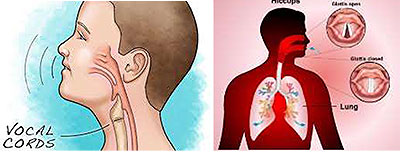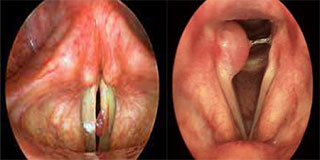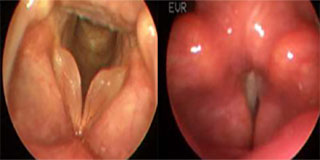Your voice is not just one of your primary means of communicating with the world – it identifies you and tells those who hear it who and what you are. Because of this, vocal problems can have a negative effect on the quality of life, both personally and professionally. While changes in your voice will cause concern among family and friends, it can also affect you professionally and impact your performance at work. For many people, the ability to speak clearly is essential to their work. Among these are singers, teachers, doctors, lawyers, nurses, business people, public speakers, those in the media, and so on. The list could go on and on. The constant use of the vocal cords places them at a great risk of developing voice-related problems.

How Speech Is Created
Sound is produced by the vibration of the vocal folds which are 2 bands of muscle positioned opposite each other in the throat. When you are not speaking, the folds are open so you are able to breathe. When you speak the brain tells the folds to move together in a specific manner while air from the lungs flows over them. This causes vibrations which become sound waves. These waves travel through the throat, mouth and nose all of which act to amplify and modulate the sound to turn it into recognizable speech.

Signs Of Vocal Problems
There are many causes for vocal problems which range from physical injury to diseases of various types. If the larynx (the voice box) is affected, the voice will often be hoarse, the volume and pitch will be limited, increased effort will be required to speak, there may be shortness of breath and frequent clearing of the throat may be required. These are the common symptoms, but there are others as well.

You may have a voice condition that requires medical treatment if your answer to any of the following questions is “yes.”
- Has your voice become hoarse or raspy?
- Have you lost your ability to hit some high notes when singing?
- Does your voice suddenly sound deeper?
- Does your throat often feel raw, achy, or strained?
- Has it become an effort to talk?
- Do you find yourself repeatedly clearing your throat?
Causes Of Hoarseness
The common causes of a hoarse voice are:
- Overuse or overstressing of the vocal cords such as speaking or singing in a manner that causes strain to the vocal cords
- Mental or emotional stress which places a strain on the vocal cords
- Inflammation due to:
- Irritation caused by smoking or other unhealthy activities
- Drying of the vocal cords
- Infections
- Acid reflux rising from the stomach and coming into contact with the vocal cords
- Allergies
- Medications taken for other health problems
- Structural changes in the vocal cords such as:
- The development of nodules
- The growth of cysts or polyps
- Bleeding caused by a variety of factors
- Nerve damage which is rare. The causes include:
- A stroke
- Post-surgical complications
- The effects of extended medical treatment
- Skull based tumours
Common Voice Disorders
- Laryngitis is a very common problem caused by an infection of the upper respiratory tract which results in the swelling of the vocal cords leading to hoarseness.
- Vocal nodules or singer’s nodes is another common condition caused by the misuse or overuse of the vocal cords or from trauma or injury to the cords. The result is hoarseness and a change in the voice including rough or raspy speech and an increased effort is speaking.
- Vocal cord paralysis is when one or both of the vocal cores become weak or paralyzed. The voice becomes weak and breathy because the cords cannot move properly. This condition can lead to coughing when consuming liquids, breathing problems, chest infections and chronic laryngeal disorders.
- Throat cancer may be the cause of a persistent change in the voice quality or continued hoarseness that continues for longer than 2 weeks. If detected early, treatment for vocal cord cancer can be very successful.


Preventing Voice Problems
1. Stay Hydrated:
- Drink at least 6 to 8 glasses of water a day
- Limit the intake of alcohol and caffeine. These cause the body to lose water and make the vocal folds and larynx dry. Alcohol can also cause irritation of the mucus membrane in the throat.
- In dry and arid climates and conditions use a humidifier or steam inhalation to hydrate the vocal cords.
- Limit the use of common cold and allergy medications. If the use of these causes voice problems, consult a doctor for alternative medications.



2. Maintain A Healthy Lifestyle:
- Do not smoke. It not only irritates the vocal folds, it can cause cancer of the vocal folds.
- Control the intake of spicy, sour and fried foods and carbonated drinks. These can cause the stomach acid to rise into the throat and damage the larynx and vocal cords
- Include plenty of fruits, vegetables and whole grains in your diet. These contain vitamins A, C and E which work to protect the vocal cords and muscles and keep the mucus membrane in the throat healthy.
- Get adequate rest. Physical fatigue has a negative effect ton the voice.
3. Use Your Voice Wisely
- Avoid speaking or singing when your voice is hoarse or when the vocal cords feel tired.
- Give your voice complete rest when you are sick. Illness places additional strain on your voice.
- Excessive use of high or low volumes can damage the voice. Avoid screaming and whispering as much as possible.
- Practice proper breathing techniques. Support your voice with deep breaths from the chest do no rely on the throat alone. Professional speakers and singers are often taught exercises to control their breath and protect their voice.
- Avoid cradling a phone between the head and shoulder for an extended period of time as this can cause muscle tension in the neck.
- Avoid places where the noise level is high as trying to speak above the ambient noise places a strain on your voice.

Voice therapy can help to protect your voice. A speech-language pathologist with experience in treating voice problems will be able to teach you how to protect your voice and speak in a healthy manner.
Article by Dr. Sundhari, MBBS, DNB(ENT), MNAMS
Consultant ENT, Head and Neck Surgeon
Kauvery Hospital, Chennai

